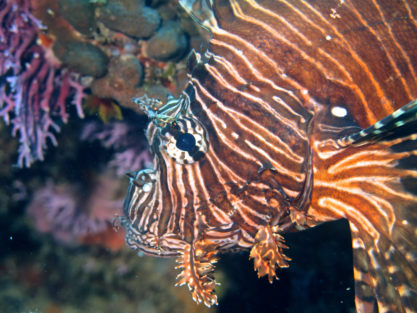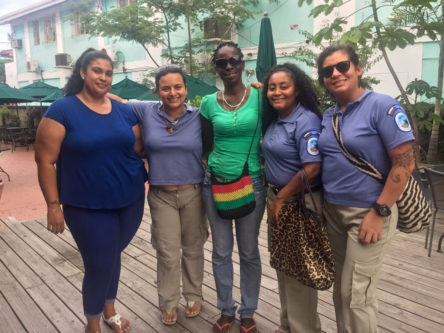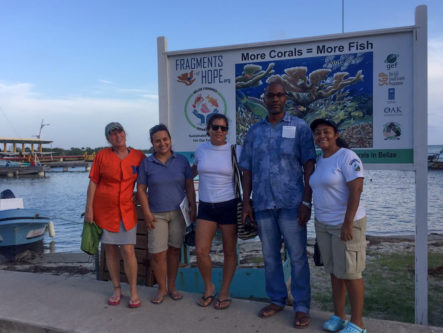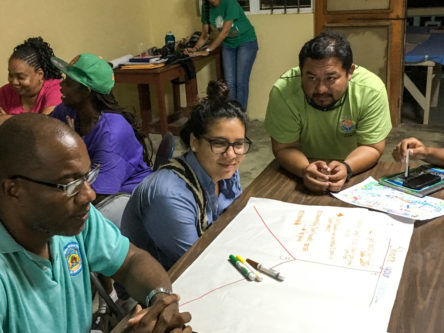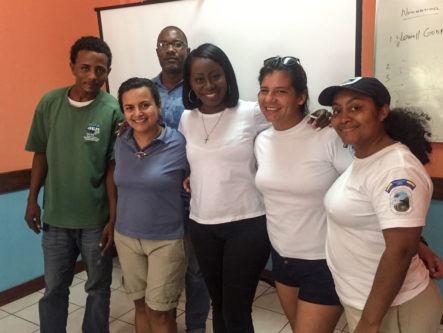As in other fields of capacity building for development there is a growing recognition within the marine conservation community of the power of practitioner–practitioner exchange. Whether they take the form of ‘barefoot’ exchanges between fishers, or more formal exchanges involving Marina Protected Area (MPA) managers and policymakers, such exchanges are emerging as an extremely effective way of sharing, replicating, adapting and scaling up successful solutions to the challenges of marine protection and avoiding repetition of unsuccessful approaches. Practitioner exchanges are particularly effective for sharing ‘how to’ or tacit knowledge about solutions, as such tips and tricks tend not be fully recorded in written descriptions or case studies.
Practitioner exchange as a form of capacity building represents a departure from more traditional approaches such as technical assistance or deployment of expert advisors. In the latter case, external experts are relied on to share successful solutions with which they are familiar only through research, and may therefore lack a complete understanding of the full range of factors and potential pitfalls that could influence the successful implementation of an approach elsewhere.
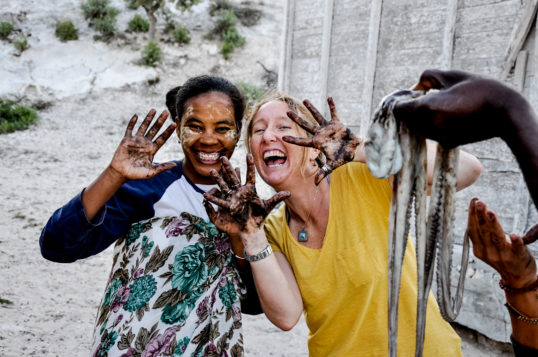
Read more about Blue Ventures sharing the temporary fisheries closure model through community exchange.
Blue Ventures has been very active in practitioner exchanges for some time, focused on sharing its pioneering work on the use of periodic, short-term fishery closures as an effective solution to balancing species conservation and livelihoods. Originally implemented in one community in Madagascar for the octopus fishery, the model has been replicated in more than 250 additional communities in Madagascar as well as in Mauritius and Tanzania. Much of this replication has been catalysed by fisher–fisher exchanges organised by Blue Ventures teams.
This past summer, I had the opportunity to partner with the Blue Ventures team in Belize in organising a practitioner exchange focused on another solution area where the organisation has been a pioneer; the development and implementation of an integrated set of market-based approaches to address the threat of invasive lionfish.
Like other countries in the region, Belize’s marine environment and associated fishing and tourism industries are threatened by the invasion of Indo-pacific lionfish (Pterois volitans). Since 2011, Blue Ventures has pioneered efforts to commercialise lionfish in Belize by working with the national government, fishers, artists, consumers, restaurants, seafood distributors and tour operators. In addition, Blue Ventures has also been at the centre of development of a science-based approach to lionfish control through research and monitoring of lionfish populations and development of a dynamic model to inform decision making on alternative solutions.
This experience has attracted the attention of other countries in the region that are interested in implementing more systematic and/or market-based approaches to lionfish control. One of these countries is Colombia, which has been very effective in raising public awareness about the threat posed by the lionfish invasion, but has been unable to reach consensus around commercialisation as a strategy for control. In the last week of August 2017, a delegation of four MPA managers from Colombia visited Belize to learn about its experience with lionfish management. The visit was organised by the Blue Ventures team in Belize and was financed by Colombia’s International Cooperation Agency.
The visit included meetings with Belize’s Fisheries Department, MPA managers, fishers, NGOs and artists, as the successful development in Belize of a market for lionfish jewellery was of particular interest to the Colombian delegates. The visit was scheduled to coincide with community consultations, organised by Blue Ventures in collaboration with the Fisheries Department, concerning Belize’s new national lionfish control strategy. The Colombian visitors were invited to join these consultations as observers, giving them a unique first-hand view of how different stakeholders in Belize view the problem of invasive lionfish and their priorities for control.
Towards the end of the exchange, Jen Chapman – Blue Ventures’ country coordinator in Belize – caught up with the Colombian delegates to discuss their visit. Inspired by the activities they had witnessed in Belize, all were motivated to develop their ideas within their MPAs back in Colombia but in four different ways.
Following the community consultations, Claudia Oviedo felt that involving local fishers as community rangers in lionfish control activities would be an effective way to manage the lionfish invasion in the Rosario and San Bernardo Corales National Park. She was also keen to discuss ways of incorporating lionfish fins into handicrafts with the community artists with whom she works.
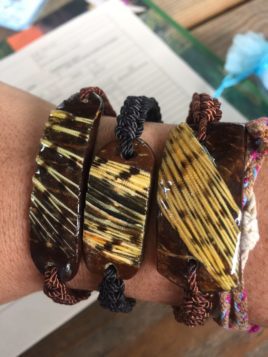
Lionfish jewellery made by the Belize Lionfish Jewelry Group
On the other hand, after meeting the lionfish jewellers from the Belize Lionfish Jewelry Group and Kaj Expressions, Roberto Hudgson Reeves from CORALINA suggested the potential for similar items in the San Andrés Archipelago was such that, in terms of revenue, lionfish fins could have even higher value than the meat. Ludovica Rodriguez, coordinator of hydrobiological resources for the National Natural Parks of the Caribbean, was more interested in gathering baseline data on lionfish populations to ensure they are managing the invasion effectively.
Like Ludovica, Elizabeth Hernandez Osono from the Tayrona National Natural Park saw potential for improving lionfish control, but she felt it would be best achieved through developing the Colombian lionfish management strategy. Furthermore, they all expressed interest in attending or facilitating future exchanges to learn about jewellery making and lionfish monitoring and management target setting, both in Belize and further afield.
As a result of this practitioner-practitioner exchange, these four people with their four different visions are in position to help Colombia tackle the lionfish invasion more effectively. As Blue Ventures continues on its innovative journey into controlling the invasion in Belize, I hope that similar exchanges will be organised with other countries to share this experience and to scale up its successes.
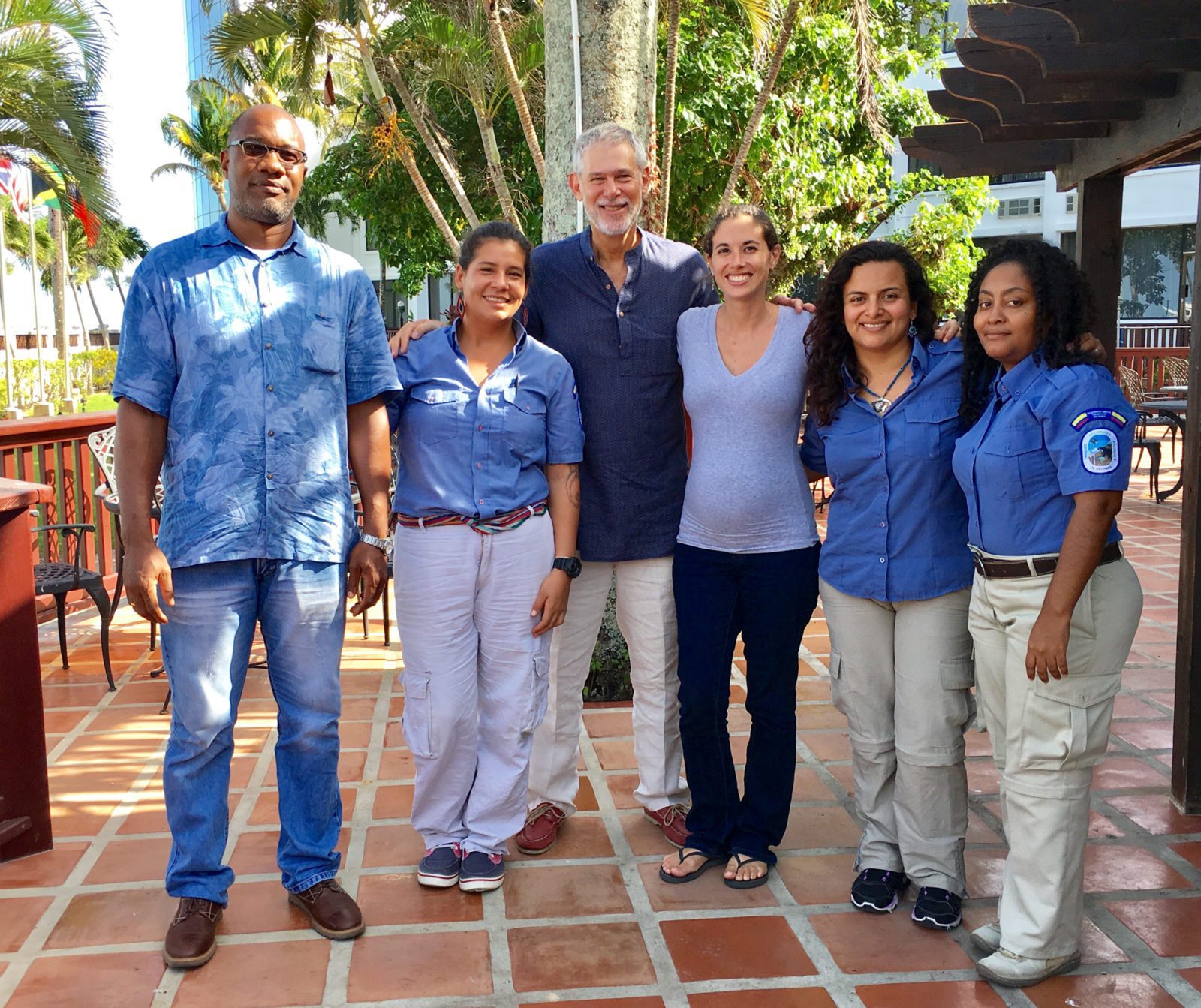
The four Colombian exchange delegates with Phil Karp and Jen Chapman, Blue Ventures’ Country Coordinator in Belize.
Witness another example of practitioner exchange in this Blue Ventures short film: Crossing the ocean – a community exchange
Join the Blue Ventures team in Belize on a Lionfish Dive Trip and contribute to valuable marine research!


